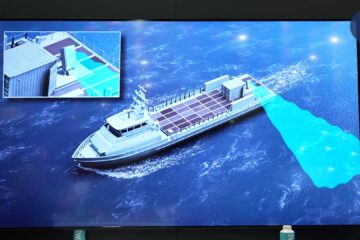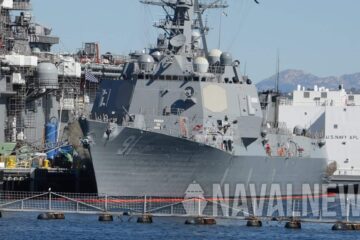Lockheed Martin and Thales closed negotiations for the supply up to 55 ALFS anti-submarine warfare sonars to the U.S. Navy, Indian Navy, Hellenic Navy and Royal Danish Navy for their MH-60R maritime helicopters.
Thales press release
Thales has delivered more than 300 ALFS sonars to the U.S. Navy since the early 2000s and this new contract with Lockheed Martin will continue to support the Navy’s readiness strategy. The navies of India, Denmark and Greece will receive their first deliveries of the ALFS sonar system through direct U.S. Foreign Military Sales of the MH-60R platforms.
To maintain control over their maritime space and protect security interests around the world, naval forces need reliable, high-performing systems to operate with optimum effect on missions including anti-submarine warfare, maritime search and rescue, defence of maritime approaches and fleet protection for naval forces on deployment.
Offering unparalleled protection to maritime convoys, the ALFS anti-submarine warfare system is capable of detecting, classifying, prosecuting, harassing or attacking submarines, making Thales the benchmark for the world’s major navies. In addition to the U.S. Navy, the other navies that have chosen Thales dipping sonar solutions include the navies of Australia, the United Kingdom, France, Norway, Sweden, the United Arab Emirates, Poland, South Korea and the Philippines.
As a low frequency active sonar, ALFS is designed for the initial detection and tracking of opposing submarines. It offers a long detection range with a wide coverage rate and a low false alarm level, both in deep and coastal waters. It can be used autonomously to clear a particular area or as a complementary anti-submarine warfare asset to sonars on board surface vessels for target relocation and attack.
“Earning the trust of the U.S. Navy and its allies and partners around the globe is a source of pride for our team. This contract enhances our position as a strategic supplier to Lockheed Martin and further consolidates the Group’s world leadership position in anti-submarine warfare systems. We will continue to improve the performance and competitiveness of our airborne sonars to meet the new anti-submarine warfare operational challenges of our customers.”
Alexis Morel, VP Underwater systems, Thales
-End-
Naval News comments:
To market and produce the AN/AQS-22 (the ALFS’ designation in the U.S. Navy), Thales was previously teaming with Raytheon. By for the contact announced today, Lockheed Martin is procuring the sonar systems directly from Thales, a Thales spokesperson told Naval News. While most of the ALFS production takes place in the United State, Thales manufactures some of the components in France (such as the system’s hydrophone stave arms, as well as the active transducer system).
The repartition per navies is the following: 8 for the US Navy, 24 for the Indian Navy, 3 for the Hellenic Navy, and 7 for the Royal Danish Navy. There is an option for 13 more for a total of 55 systems.
The Thales ALFS and FLASH systems are from the same product family of airborne anti-submarine dipping sonars but each product has variances due to system destinations and the local technological requirements to comply with, including U.S. ITAR.
The FLASH (Folding Light Acoustic System for Helicopters) system comes in several versions include “compact FLASH” for lightweight helicopters and “FLASH SONICS” combining the dipping sonar with active and passive sonobuoy processing system.

According to Thales, when used in conjunction with a Low Frequency VDS (Variable Depth Sonar), the FLASH/VDS combination constitutes a terrific ASW system to detect, locate and classify more and more stealthy and capable submarines in any environment. For the record, two French Navy FREMM Frigates – both equipped with CAPTAS-4 and fitted with ship-borne NFH90/Caiman ASW helicopters fitted with FLASH – recently won the US Navy’s “Hook’em” award for their exceptional ability to find and track submarines.






